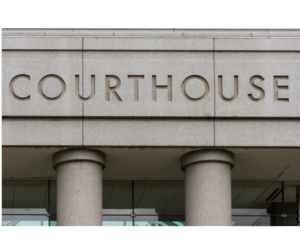You’ve been arrested, now what?
After your arrest and going through the booking process at the detention center you will be taken before a magistrate judge who will set your initial bond. The magistrate will set this based purely on the charges and often without consideration to the specific facts and defenses in your case. You are not entitled to an attorney at this initial hearing.
If you are booked on a serious offense, the bond given to you at your first appearance might be too large for you or your family to make. In a short list of cases, the magistrate is unable to give you a bond and you will sit in jail until there is a superior court judge available to handle the issue of bond. Georgia Law states that persons charged with the following offenses can only have bail set before a superior court judge: Treason, Murder, Rape, Aggravated Sodomy, Armed Robbery, Home Invasion in the First Degree, Aggravated child molestation, Aggravated sexual battery, Aggravated Stalking. O.C.G.A. 17-6-1(a)(1-13).
you or your family to make. In a short list of cases, the magistrate is unable to give you a bond and you will sit in jail until there is a superior court judge available to handle the issue of bond. Georgia Law states that persons charged with the following offenses can only have bail set before a superior court judge: Treason, Murder, Rape, Aggravated Sodomy, Armed Robbery, Home Invasion in the First Degree, Aggravated child molestation, Aggravated sexual battery, Aggravated Stalking. O.C.G.A. 17-6-1(a)(1-13).
If you cannot make your current bond there are two options to handle the issue: Preliminary Hearings and Bond Reduction Hearings.
Preliminary Hearing
The best way to think about a preliminary hearing is as a short version of the possible trial that could happen at the end of your case. The State will have to bring witnesses to tell the presiding magistrate the factual basis for the charges you are accused of. It is important to have an attorney at this point because your attorney can cross examine any witnesses to start poking holes in the State’s case. This is your first opportunity to see parts of the evidence against you and to plan your defenses for the rest of the case. At the end of a preliminary hearing, the presiding judge will decide whether or not there is probable cause to believe the defendant committed the crimes charged. If the judge finds that probable cause does not exist the charges will be dismissed then and there.
Bond Hearings
The other option is to have a bond reduction hearing. At these hearings the court is looking at your history and your ties to the community to see if you are a risk not to show up to court when your case comes on the docket. The four factors the court will look at to determine this are if the Defendant is;
- A significant risk of flight
- A significant risk of danger to person or property in the community
- A significant risk of committing any felony pending trial
- A significant risk of intimidating any witnesses in the case
You without a doubt need an attorney to argue these factors. Each judge weighs the factors differently. Attorney Adam Harkness who has experience in the north east Georgia courtrooms will know which facts of your history to highlight in order to get your bond lower. Whatever the particular details of your case, the attorneys at Harkness & Associates will tie it all together in a clear, cohesive message to the presiding judge.
Attorney Adam Harkness who has experience in the north east Georgia courtrooms will know which facts of your history to highlight in order to get your bond lower. Whatever the particular details of your case, the attorneys at Harkness & Associates will tie it all together in a clear, cohesive message to the presiding judge.
What to expect in Court
Being summoned to court to face charges is difficult and nerve-racking. You will be in an unfamiliar room with a variety of strangers, courtroom staff, and a table of prosecuting attorneys that have your future in their files. Do not go into this environment alone. Having an attorney from this office with you in court will take all of your stress away and replace it with confidence. We will keep you up to date on all developments in your case and answer the questions you have.
At the resolution of your case you will need to appear in court. There are ways of dress and acting that the judge will expect of you. What you need to remember is the ‘Two Be’s’:
- Be on time
- This speaks for itself but the judge will know if you are late to your court date. Each court date begins with a roll call of the cases that day and if you are not there the judge will know. The judge is the person ultimately approving or rejecting the resolution to your case and being late to court will affect this. In the worst case scenario where you miss your court date entirely, you will have a bench warrant issued against you meaning that you can be arrested for missing your court date. When you hire our team, we will receive all of the court notices that you do for your court dates. This means that we will be checking in with you to make sure you know when and where you need to be and what to expect from those days.
- Be respectful
- This includes how you act, speak, and dress in the courtroom. All of these can affect the outcome of your case. When speaking to the courtroom staff and other attorneys use “Yes sir.” and “Yes ma’am.” When speaking to the Judge whether they are a man or woman, refer to them as “Your Honor”. In many Georgia Courts if you cell phone sounds off during proceedings of any kind it will be taken up by courtroom staff until you leave. Court is a formal place and these small gestures of respect are expected of all people involved in court that day.
- MEN: Long sleeve button up shirt and slacks with closed toed dress shoes.

- WOMEN: Conservative top (in color and style) with slacks and closed toed
 shoes. Avoid excessive accessories and accessories that make noise.
shoes. Avoid excessive accessories and accessories that make noise. - Furthermore, there is a minimum level of dress expected. No hats are allowed, no torn jeans, and no flip flops. You are not allowed to wear tank tops or short skirts. For the ladies no tops exposing your midsection will be allowed. Shorts are strongly discouraged. If your dress is not up to the formal standard of court you will not be allowed in the courtroom. If you miss your court date because of not being dressed appropriately it will be blamed on you. You do NOT need to show up in your best Sunday Suit or dress but you need to dress in a way that shows the court you understand the seriousness of the situation.
Dressing appropriately, acting appropriately, and being on time are all things technically unrelated to your case but can affect the outcome. Use these to your advantage and let the judge know that you are taking your case seriously.
Frequently Asked Questions
Why is it important to have a DUI lawyer who specializes in drunk driving law in Georgia?
Having a DUI lawyer who specializes in drunk driving law in Georgia is crucial because Georgia DUI laws are constantly evolving and can be quite complex. A seasoned DUI attorney will be well-versed in the latest court rulings and legal nuances surrounding DUI cases in the state. By having a knowledgeable lawyer on your side, you can ensure that your case is maneuvered skillfully to achieve the best possible outcome for you and your loved ones.
Who decides the sentencing for DUI convictions in Georgia?
In Georgia, the sentencing for DUI convictions is determined by the judge. The severity and duration of penalties for both misdemeanor and felony DUI convictions are at the discretion of the judge, within the boundaries of mandated minimum sentencing guidelines.
What trial formats are available in Georgia DUI cases?
In Georgia DUI cases, individuals have several options for trial formats. One such option is a bench trial, where only a judge makes the decision on guilt or innocence without a jury present. The decision of which trial format to pursue is often guided by legal counsel who consider factors such as the judge’s background and judicial record. The choice of trial format can significantly impact the outcome of the case, making it crucial for individuals to consider their options carefully based on the circumstances of their particular case.
How does the process of requesting a trial work in a DUI case?
In a DUI case, the process of requesting a trial typically involves the consideration of several key factors. When facing charges for driving under the influence, individuals may have the option to request a trial. The type of trial available can vary based on the nature of the charges and the court in which the case is being heard.
In misdemeanor cases related to DUI offenses, the jury usually consists of six jurors, while felony cases may involve twelve jurors. During the jury selection process, potential jurors are interviewed to ensure fairness in judgment. It is essential to note that municipal courts in certain jurisdictions may not conduct jury trials for DUI cases, with only State Courts or Superior Courts having the authority to hold such trials.
Moreover, individuals facing DUI charges may have the option of a bench trial, where a judge alone decides on their guilt or innocence. The decision on the type of trial to pursue, whether a jury trial or a bench trial, may be recommended by legal counsel based on factors such as the specifics of the case and the background and judicial record of the presiding judge.
Therefore, the process of requesting a trial in a DUI case involves understanding the available trial options, considering the specific circumstances of the case, and receiving guidance from legal professionals on the most suitable course of action.
How are motions used during preliminary hearings in DUI cases?
During preliminary hearings in DUI cases, motions are crucial legal tools used to advocate for specific outcomes. These motions can include requests to exclude evidence based on procedural errors by law enforcement, as well as motions seeking the dismissal of the case entirely. Both prosecutors and defense attorneys present their arguments regarding these motions to the judge for consideration.
Typically, these preliminary hearings involve the judge, the prosecutor, the defense attorney representing the defendant, and the arresting officer. The proceedings involve a back-and-forth exchange of legal arguments, with each side seeking to persuade the judge to grant their respective positions.
The judge does not usually make an immediate decision during the hearing, with the final ruling potentially taking weeks to be handed down. This period allows the judge to carefully evaluate the arguments presented and reach a reasoned decision based on the law and evidence. Throughout this process, experienced attorneys leverage their knowledge and expertise to plot their strategies, similar to a strategic chess match, with the aim of securing a favorable outcome for their client.
What are the two categories of criminal offenses in Georgia?
In Georgia, criminal offenses are classified into two main categories based on the severity of the crime committed. The first category is misdemeanors, which encompass lesser crimes such as first offense DUI, harassment, or shoplifting. The second category is felonies, which consist of more serious offenses like felony DUI. Felonies carry stiffer penalties compared to misdemeanors, including longer jail time, extended probation periods, and lengthier driver’s license suspensions.
What occurs at an arraignment in a Georgia DUI case?
During an arraignment in a Georgia DUI case, the charges are formally presented, and the defendant is required to enter a plea. The available pleas are typically guilty, not guilty, or nolo contendere (no contest). It is important to note that physical presence in court may not always be necessary, as legal representatives can attend on behalf of the defendant and enter a plea of not guilty to kickstart the defense against the prosecution’s case.
Where are misdemeanor drunk driving cases typically resolved in Georgia?
Misdemeanor drunk driving cases in Georgia are typically resolved within the jurisdiction of a Georgia Municipal Court. These courts commonly handle such cases as part of their regular proceedings, overseeing the legal resolution of misdemeanor drunk driving charges.
What is the difference between misdemeanor DUI and felony DUI in Georgia?
In Georgia, the distinction between misdemeanor DUI and felony DUI lies in the severity of the offense and the corresponding consequences. A misdemeanor DUI, such as a first offense, involves lesser crimes like harassment, shoplifting, or a DUI charge where the penalties are comparatively lighter. On the other hand, felony DUI is considered a more serious crime than misdemeanor DUI, leading to harsher repercussions that include increased jail time, longer probation periods, and an extended loss of driving privileges.
What are the different types of bail options available, such as Signature or Own Recognizance Bond, Cash Bond, Sureties (Bail Bondsman), and Property Bond?
Various types of bail options are available to individuals who are awaiting trial or facing charges. These options include a Signature or Own Recognizance Bond, Cash Bond, Sureties (Bail Bondsman), and Property Bond.
1. Signature or Own Recognizance Bond:- This type of bond does not require any payment upfront; instead, the individual is released with just a signature promising to appear in court for their scheduled hearings.- Typically offered for misdemeanor cases involving individuals with clean records and ties to the community.- Those released on this bond may be subject to monitoring by the jurisdiction’s pre-trial release program.
2. Cash Bond:- A cash bond requires the individual or someone else to pay the entire bail amount in cash.- If the individual fulfills their court obligations and does not miss any scheduled appearances, the money can be returned after the case is resolved with proof of the final disposition.
3. Sureties (Bail Bondsman):- Individuals have the option to contact a bail bondsman who can post the bail amount on their behalf.- Bail bondsmen charge a non-refundable fee for their services, which is a percentage of the face value of the bond (usually 12% for bonds under $10,000 and 15% for bonds over $10,000).- The bonding company will ensure that the individual appears in court, as they may pursue legal actions to collect the full bond amount if the individual fails to appear.
4. Property Bond:- In some cases, individuals can post property as collateral instead of cash for their bail.- This option requires valid proof of ownership through a warranty deed and relevant loan and tax documents.- Posting property as bond results in a lien on the property for the amount of the bail until the case is resolved.
Where are your offices located, and how can I contact you?
We have offices located in Demorest Georgia and Toccoa Georgia. The Demorest Office address is 700 Central Ave, Demorest, GA 30535 and the Toccoa office is located at 12 W Currahee St, Toccoa, GA 30577. You can call us at (706) 778-2326 or you can email phil@adamharkness.com
